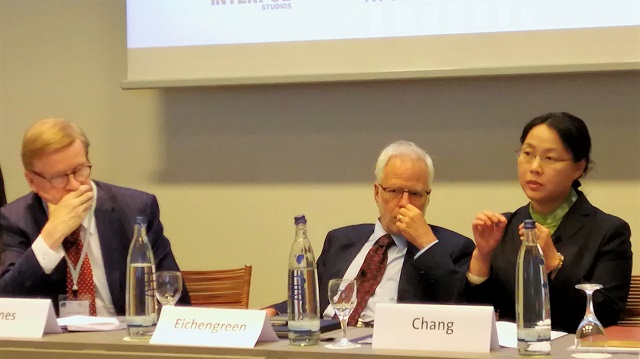
AMRO Director Dr Junhong Chang (right) emphasizes the importance of cooperation among global and regional financial arrangements at the “Living without Globalization?” seminar in Hamburg, Germany, on July 4, 2017.
HAMBURG, GERMANY, July 4, 2017 – In an increasingly integrated world, global and regional financial arrangements should be enhanced and should cooperate better with one another as safety nets against financial crises and contagion, Dr Junhong Chang, Director of the ASEAN+3 Macroeconomic Research Office (AMRO), highlighted at a global seminar held today in Hamburg, Germany.
With the theme of “Living without Globalization?”, the seminar was co-hosted by the Reinventing Bretton Woods Committee and the Hamburg Institute of International Economics.
Speaking in a panel discussion on “Emerging Economies in the New Context of The Globalization Process – Global Governance”, Dr Chang noted that the ASEAN+3 region has benefitted greatly from globalization through international trade and investment flows. The policy challenge for the region is to continue to reap the benefits from globalization, including capital inflows, while managing the risks to financial stability. While economies in the ASEAN+3 region have become more resilient, built up foreign reserve buffers, and enhanced their macroeconomic management frameworks, there are risks of contagion from global policy uncertainty. This reinforces the case for robust global and regional safety nets, such as the Chiang Mai Initiative Multilateralisation (CMIM), as a second line of defense for regional economies in addition to their own reserves.
The Asian Financial Crisis and Global Financial Crisis brought up questions on how to further enhance the effectiveness of the Global Financial Safety Net (GFSN). In this context, expanding the role of Regional Financial Arrangements (RFAs) in the GFSN can make important contribution in safeguarding regional and global financial stability, Dr Chang elaborated. She further outlined that AMRO/CMIM complements the global financial architecture in three ways: (i) AMRO/CMIM fills in a financing gap in GFSN ; (ii) AMRO’s surveillance complements the IMF and other IFIs’ assessment through deeper understanding of the specifics of the regional members; and (iii) AMRO’s technical assistance to member economies contributes to the improvement of ASEAN+3 members macroeconomic surveillance capabilities and database.
Given the more challenging global economic and financial situation, she suggested that the role of RFAs and their collaboration with the IMF with an aim of enhancing synergies between the different layers of the GFSN should be reinforced.
